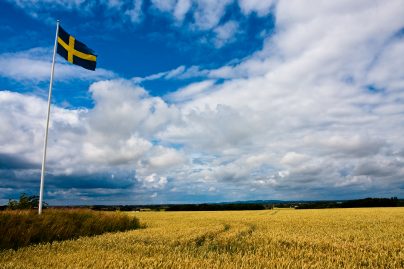27.02.18
The Arctic’s Share: Birthing Whisky in Sweden
Centuries after the vikings helped create the Scotland of today, our national drink has been making inroads into the Swedish spirits market. Homegrown Whisky production, after all, only began in Sweden in 1999. After a couple of rocky starts, it turns out it needed those from the land of Volvo and meatballs a couple of whisky visits to our bountiful land to ‘Sweden the deal.’ (…Sorry). Over to Meja…
Though Swedish whisky has only been established the past couple of decades, it has long been placed in the shadow by other alcoholic beverages. This is primarily due to clubs and bars in Sweden being dominated by other alcoholic drinks.
Beyond this, a Swedish whisky culture has been created with a focus on interest and tradition, with the most amount of attention coming from older generations. Groups and clubs who still champion traditional techniques of producing whisky regularly arrange tasting occasions, meetings and other events regarding whisky together. Meanwhile, established companies and distillations give a distinctly Swedish touch to Scotland’s national drink. There is, in fact, a large industry for whisky distillers like Mackmyra, Box and Smögen Whisky, who retain the interest of the older generation by giving them access to gorgeous whiskies made on Swedish soil.
Box, in particular, was recently voted as “the world’s most exciting new distillery,” likely meaning that their influence extends well beyond Sweden’s stereotypical whisky fan. Smögen, meanwhile have made a name for themselves by the dedication of their founder, Pär Caldenby, a long-time whisky lover who has written a book on drinking single malt, brought out a distinct London Dry Gin and, naturally, started his own distillery. Spirit of Hven, meanwhile are distinct for only being a short distance away from the Danish coast. Their master distiller, Henric Mollin is a chemist by profession who summons up flavours for other alcohol producers on the side of his main venture.
Mackmyra was the first company that brought up the question on the minds of Swedish whisky enthusiasts: why hadn’t there been any Swedish whisky brands established? They started to formulate a plan to produce a Scotch-leaning whisky, all with ingredients produced within Sweden. Starting the project scouring for the best recipe from over 170 different tastes, they ended up with the two very best, after many tests and tasting, being produced in the first pilot-distillery in Sweden. Since then, the successes of Swedish whisky production have gone from strength to strength. In 2005, the idea of the whisky company ‘Box’ started to grow after an inspiring journey to Scotland, and their dreams of setting up a swedish whisky distillery became reality in 2010. Around the same time, Smögen Whisky adopted the Scottish idea of flavoring the whisky after the location, and decided to design the Bohus whisky with roots and flavourings from the coast and seaside environment.
As Swedish whisky companies are being established, it’s important to give the whisky the name on the Swedish market that it deserves. Improving the knowledge regarding the history, heritage, mix and character for employees in the licensed trade, it’s shown that this contributes to an uplift in sales. At the core of whisky training is the idea of giving yourself and others the confidence, experience and knowledge to further professional whisky sales.
The Whisky Ambassador is the first accredited whisky course for both the licensed trade and for whisky enthusiasts. It’s uniquely designed to give the delegates a hand of Scotland’s national drink by immersing yourself in the history, geography and heritage but also the character, taste and mix. The course will also teach delegates the message of ‘Drink Less, Drink Better,’ that lays at the heart of the Whisky Ambassador. The idea and principles of the Whisky Ambassador was to give people, both employees and others, the confidence to sell the whisky and treat customers in a professional way. After being established in Scotland, whisky sales were increasing for those companies who have been delegated in the courses. Among those include Radisson Blu, Trump, Missoni and Cameron House. Increased customer satisfaction and better staff motivation have also been reported. The enthusiastic response to the business has also been to give the company the profitability to develop its content and plan further ideas regarding alcoholic beverages, for instance Gin.
The Whisky Ambassador can give people in Sweden, both employees and others, an intimate knowledge of Scottish national drink. The courses give those who are employed in the restaurants, hotels and bars the confidence, experience and knowledge about the whisky to give the it the place in the Swedish market it deserves. The Whisky Ambassador has expanded to 19 other countries and four continents teaching people about whisky and it is time for us in Sweden to keep up the work based on Whisky’s ever-increasing popularity and interest regarding whisky and whisky sales.
Meja Engström

Comments